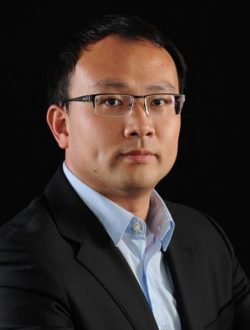Biography
Changzhi Li received the Ph.D. degree in electrical engineering from the University of Florida, Gainesville, FL, in 2009. He is a Professor at Texas Tech University. His research interest is microwave/millimeter-wave sensing for healthcare, security, and human-machine interface.
Dr. Li is a Microwave Theory and Techniques Society (MTT-S) Distinguished Microwave Lecturer. He was a recipient of the IEEE Microwave Theory and Techniques Society (MTT-S) Outstanding Young Engineer Award, the IEEE Sensors Council Early Career Technical Achievement Award, the ASEE Frederick Emmons Terman Award, the IEEE-HKN Outstanding Young Professional Award, and the U.S. National Science Foundation (NSF) Faculty CAREER Award. He is an Associate Editor of the IEEE TRANSACTIONS ON MICROWAVE THEORY AND TECHNIQUES and the IEEE JOURNAL OF ELECTROMAGNETICS, RF AND MICROWAVES IN MEDICINE AND BIOLOGY. He is the TPC chair of the 2022 IEEE Radio & Wireless Week. He served as the chair of the MTT-S Technical Committee “Biological Effect and Medical Applications of RF and Microwave” from 2018 to 2019, a TPC Co-Chair for the IEEE MTT-S International Microwave Biomedical Conference from 2018 to 2019, and the IEEE Wireless and Microwave Technology Conference from 2012 to 2013.
Presentations
Portable Radar Systems for Life Activity Sensing, Anomaly Detection, and Human Tracking
By sensing various life activities with microwave signals, portable radar sensors with state-of-the-art front-end and measurement algorithms have great potential to improve healthcare, security, and human-machine interface. This presentation will first provide an overview on the state-of-the-art smart radar sensors powered by advanced digital/RF beamforming, multiple-input and multiple-output (MIMO), synthetic aperture radar (SAR), inverse synthetic-aperture radar (ISAR), and deep learning. A few examples based on interferometry, Doppler, frequency-shift keying (FSK), and frequency-modulated continuous-wave (FMCW) modes at 5.8 GHz, 24 GHz, and 120 GHz will be discussed. In addition, the use of nonlinear technologies will be reported, with a focus on in-band third-order intermodulation measurement for enhanced target identification and parameter extraction. Case studies at this exciting human-microwave frontier will be given on physiological signal sensing, non-contact human-computer interface, driving behavior recognition, human tracking, and anomaly detection.
As smart radar sensors enter the healthcare, transportation, and smart living sectors of daily life, measures to enhance its security against malicious attacks are of paramount importance. This part of the talk will discuss possible ways of malicious attacks based on spoofing and jamming to radar sensors. Then technologies that mitigate potential attacks will be unveiled to make smart radar sensors more secure and trustworthy. Finally, this talk will conclude with future industrial and academic R&D outlooks for microwave short-range life activities sensing.
